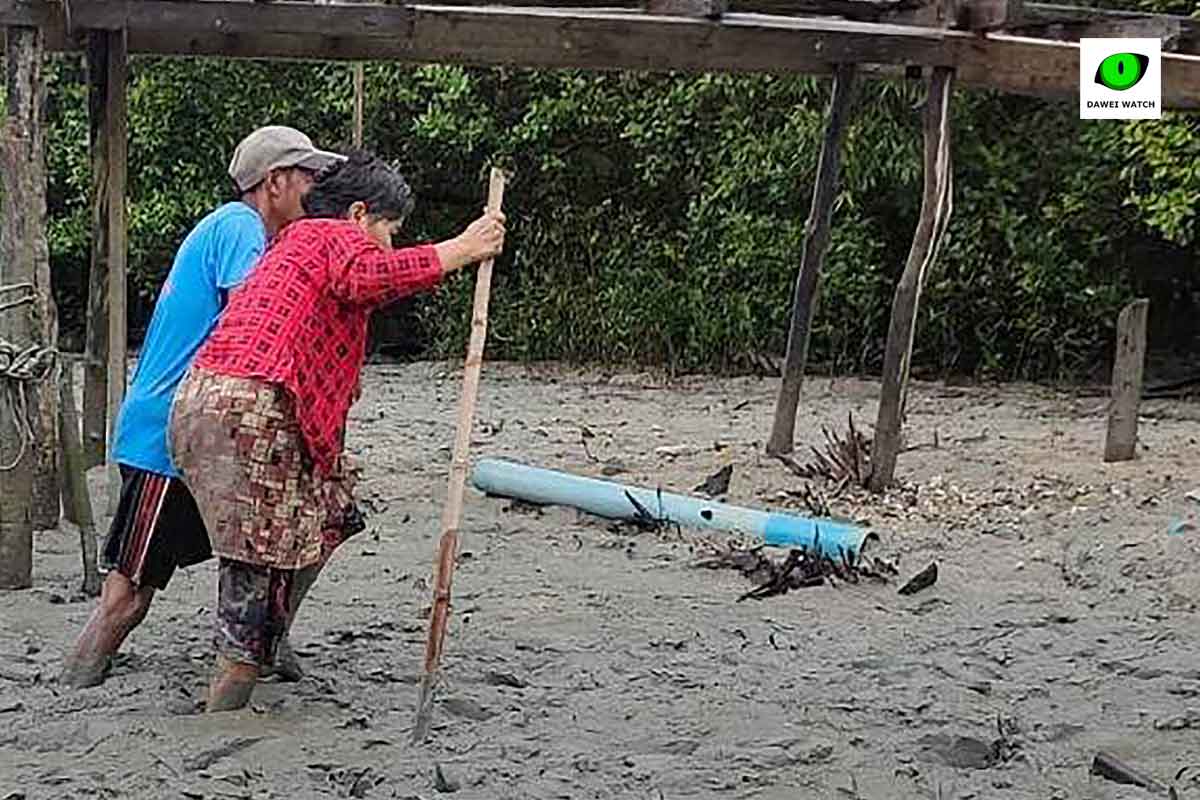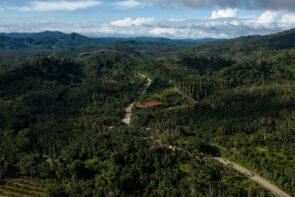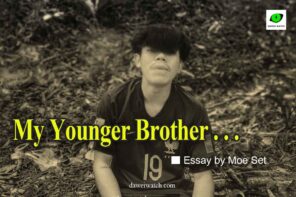One of the biggest groups of victims in the civil war in Myanmar has been elderly people, who cannot run to flee battles or who starve to death or fall ill when there is no one to look after them.
Before the fighting broke out, many elderly people in country villages sought Dhamma in their late years – a peace of mind that calms the soul. But that quest has had to be postponed for now.
Instead of seeking Dhamma, the elderly in the countryside now have to find a safe place to lay low, away from the fighting. And as the conflict has spread across the country, there are few safe places for the elderly.
“Fighting erupts often here. We can’t live peacefully. We have to struggle for our survival,” said Phwa Mae Aye.
The 68-year-old is from Ya-Laing village in the Dawei Special Economic Zone, where fighting has been going on for days.
Since the military coup, old people in Myanmar have not been safe and have not received enough food and medical care, according to the World Health Organization, or WHO.
Many old people cannot easily run to find a hiding place and often remain in their village houses and get trapped in battles. Many of the elderly have lost their lives after becoming trapped while the fighting raged around them.
Some elderly men and women who tried to run away from battles have lost their lives in various ways – hit by shrapnel from bombs, bullet wounds or extra-judicial killings by junta troops. Nobody knows the exact numbers as no records have been kept.
Seventy-one per cent of senior citizens in Myanmar were suffering from a lack of health care, low incomes, other hazards and loneliness, according to a report on the needs of elderly people in Myanmar done with the support of the UN Office for the Coordination of Humanitarian Affairs and released in 2023.
A lack of basic needs
The number of people having difficulties finding their basic needs has been increasing due to the battles, conflicts and the many crises caused by the military coup.
While many young people chose to fight or leave, the elderly are the ones who bear most of the brunt of the hardships – finding food, clothing and shelter.
Some elderly people struggle because they have no children to care for them, and there are other old people who were left helpless when their children left home for various reasons.
In the cities and towns, many old people struggle to survive because of economic hardships, and that is often the case in the countryside as well.
Many elderly citizens used to get by with the support of charity groups before the coup, but now they have nothing to eat as the groups which supported them no longer exist.
In Myanmar, 71% of old women and 54% of old men did not have enough food, the UN report on the state of the needs of old people stated.
Moreover, the report pointed out that 60% of old women and 52% of old men were out of reach of health services.
Starved at home
Phwa Mae Aye was trapped for 14 days when fighting broke out near her village in the last week of June.
“Hearing those sounds (shootings and explosions), I could not sleep. I dared not light a lamp. I said prayers the whole night till the day broke,” said Phwa Mae Aye.
Although all the villagers ran away when a military column marched in, the old people like Phwa Mae Aye remained or were left in the village, saying prayers.
Some were killed by bullets amid the fighting and some survivors starved to death because they had nothing to eat.
Many old people who had starved were found lying on their floors because they had to stay home until the junta’s military column left the village, said Comrade Kyauk Khae, the information officer with the Daung Min Operation Group based in Thayet Chaung Township.
Although there had been some food in their homes, junta soldiers took it all and the elderly were left with nothing to eat.
“They took every edible thing from my house. Even the fish paste box was gone,” said Phwa Mae Aye.
During the 14 days she was trapped in her house, Phwa Mae Aye subsisted on rice and water that lasted only four days. Fortunately, she survived.
Not spared despite their old age
Many elderly people were hit by bullets and killed during the fighting. There were also old people who did not run, assuming they would not be killed because of their age. Many were killed afterwards and some died when their houses were burned down by junta troops.
Daw Khin Aye, over 80, from the town of Laung Lone, died on April 26 when she was hit by shrapnel from a bomb fired by junta troops based in Laung Lone, which landed in her house’s compound.
In another incident, fighting broke out at Maung Mae Shaung village near Dawei on June 14. After the battle, junta troops checked the houses and killed 80-year-old U Hla Myint, who remained in the village because he could not run.
During a battle at Shut Pone village-tract in Pu-Law Township on September 19, a 70-year-old woman was set of fire and died.
Although revolutionary soldiers have tried to save old people from being trapped in the fighting, they found that many old people refused to go with them, said Comrade Kyauk-Khae, from the Daung Min Operation Group.
“Old people do fear for their lives. But they don’t want to be burdens on their children. They don’t want to come with their children, fearing they’ll be a burden on them. They decide to remain at home, even if they die,” he said.
Pack a bag and run
Some elderly people who run into the forests and mountains after fearing they would be trapped in the fighting do not escape danger.
U Pe Than, 80, from Wae Yit village in Thayet Chaung Township, ran out of breath and died while running from battles.
Similarly, in 2023, an old man from Taung Pyauk village-tract in Thayet Chaung Township was killed by a snake bite and another old woman was crushed to death by a log.
Many elderly people are uncertain if they should pack up their lives and run when battles start. They find themselves in a dilemma – they are neither safe at home, nor they can run far from life-threatening danger.
Another problem for the elderly is their health ¬– many are already weak and cannot be easily cured when they have a disease.
Many show symptoms of depression if they make it to refugee camps, according to the assistance providers.
“Most of the old people have relaxed the hold on themselves. They say something like ‘it’s just fate, we don’t have much time,’ etc,” said Jonathan from the Dawna Thanintharyi IDP Supporting Group.
Homesickness at the end of life
Although their children would like to move them to safety when fighting erupts, some old people say they would rather stay in their homes.
U Ngwe Pu (not his real name) from Maung Mae Shaung village was one of these. U Ngwe Pu, who was having medical treatment in Dawei while staying away from the battles, was not aware that his village had become a battlefield.
All the people from his village, about seven miles from Dawei, fled because the military had burned the village again and again.
But no matter how much his children tried explaining the situation to him – saying he could not go back to his house – the 70-year-old grandfather kept asking them to send him home.
He told his daughter: “I will go home. I will live alone in the village, no matter whether anyone lives there.” When his children were not around, he tried to go back to his village and his children looked for him and brought him back, his daughter said.
Phwa Mae Aye from Ya Laing village is not safe in her village and U Ngwe Pu from Maung Mae Shaung village still cannot not go back to his village.
U Ngwe Pu’s daughter talked about the one wish her father made when he said his prayers every night.
“May I go back to my village quickly. May peace fall upon my village.”
——– END ———







